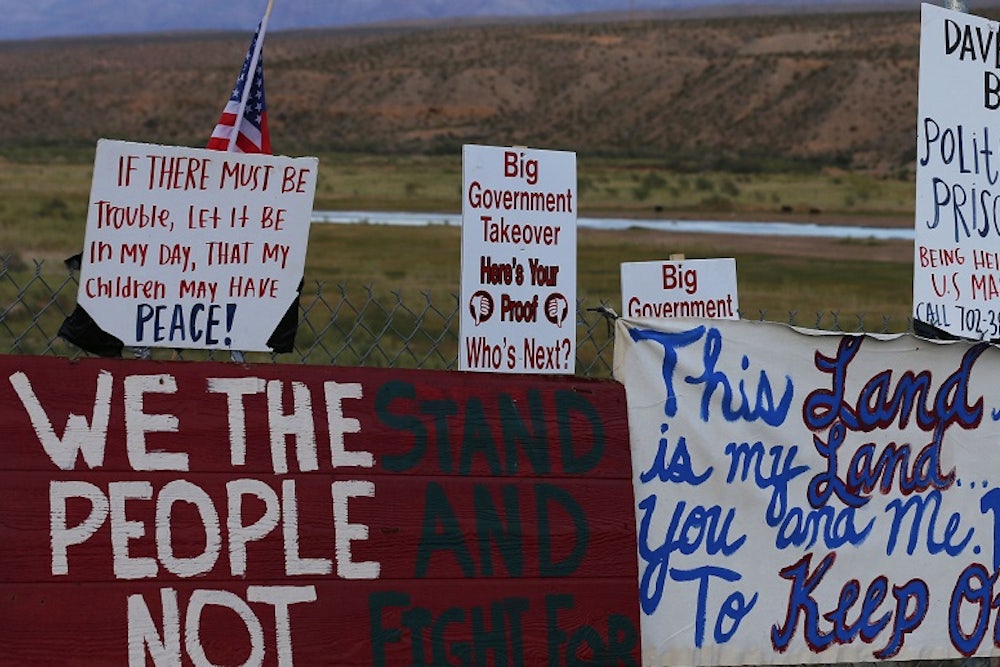Mahatma Gandhi was a lawyer in India who led a fight for independence so that millions of people could be free of sometimes brutal British repression.
Cliven Bundy is a rancher in Nevada who is fighting federal authorities because he thinks his cows should be able to graze at will on the government’s land.
Don’t see the similarity? Kevin Williamson of National Review does. And therein lies a broader tale about conservatives and the perception they’ve created—about the legitimacy of the Obama presidency and even the federal government itself.
In an essay that ran on Tuesday, Williamson likens Bundy, whose confrontation with federal agents has made national news, to not just Gandhi but also to George Washington and whites who harbored slaves in the 1800s, in violation of the Fugitive Slave Act. All were guilty of breaking the law, he says. But all had their reasons. “Of course the law is against Cliven Bundy,” Williamson writes. “How could it be otherwise? The law was against Mohandas Gandhi, too, when he was tried for sedition.” But ultimately he thinks we should not condemn, or even excuse, Bundy for the same reasons we celebrate those freedom fighters of yore. They were fighting for righteous causes and, even in a society of laws, sometimes “a little sedition is an excellent thing.”
He’s right about Gandhi and Washington, obviously. The problem is his effort to include Bundy in the same conversation or anywhere near it. Williamson includes a perfunctory disclaimer, about differences in scale and proportionality. But the differences run much deeper than that. Bundy has all the rights and privileges that Gandhi’s and Washington’s people so desperately sought. He can speak his mind freely and practice whatever religion he wants. He can use an impartial judicial system to make grievances and he has the right to bear arms. Those last two should be obvious, given what has happened. His battle with the Bureau of Land Management (BLM) has been ongoing for two decades. He has sued the federal government multiple times and lost every time—and even conservatives, including Williamson, roundly admit he has exhausted his legal options. That’s why, after the Feds finally cracked down, he and a few hundred of his friends took up arms against federal authorities in a tense standoff over the BLM’s lawful, overdue actions.
Bundy also has the most precious right at all—the one that was at the very heart of Indian and American independence movements. He can vote in elections that determine who governs the country. But he can’t dictate outcomes he wants. And that’s his grievance: He objects to federal laws that prohibit his cattle from using government land. Bundy has at his disposal the same tools for fighting this as every other American citizen. He can organize, write letters and support kindred interest groups—whatever it takes to elect officials who will change that land policy. But until that happens, he remains subject to those laws.
Bundy is an extreme case, of course, and the same might be said of Williamson’s article. (One of Williamson's own colleagues, National Review's Charles Cooke, wrote a response condemning Bundy, citing the rule of law.) But the underlying idea in Williamson's column is one that Republicans and their allies have endorsed repeatedly—that Obama and the federal government don’t really have the authority to govern. Here, for example, is Rich Lowry, editor at National Review, during a recent appearance on Fox News: “One of the cases that the sympathizers with Bundy are making is that government itself is lawless,” Lowry said. “If the government is picking and choosing what laws it's going to enforce on immigration or health care or gay marriage, why doesn't Bundy get to pick and choose what laws he's going to honor? I think it would be better if everyone honored the law, but we have a lawless government at the moment.”
And we’ve heard this theme many times before. Sean Hannity has said that Obama shows a “pattern of lawlessness which the president enforces the laws he likes, refuses to enforce, or just unilaterally alters laws he disagrees with.” When the House of Representatives voted to hold Attorney General Eric Holder in contempt in 2012, Texas Governor Rick Perry commended them for “not allow[ing] the Obama Administration to hide its lawless, reckless and deadly actions from the American public.” In January, Senator Ted Cruz wrote an op-ed in the Wall Street Journal about Obama’s “imperial presidency” and warned that: “[W]hen a president can pick and choose which laws to follow and which to ignore, he is no longer a president.”
It’s hard to imagine these conservatives would tolerate actual lawlessness, or even rhetorical endorsements of it, if liberals responded this way to a Republican President. (As Jamelle Bouie noted the other day at Slate, it’s even harder to imagine conservatives reacting this way if the resisters were African-American.) The excuse conservatives give is that Obama really has crossed the line—that he, and the federal government, has usurped authority in a way that violates basic democratic norms. And so Obamacare is not just expensive and going to make health care worse—it’s tyranny. Obama’s executive order on deportations is not just a way to prioritize the immigration department in a humane way—it undermines the legal fabric of the country. The Justice Department’s refusal to defend the Defense of Marriage Act is a betrayal of the constitution. And so on.
These things aren’t true. Obama’s policies may be good or bad, but they aren’t fundamental violations of liberty, any more than Bundy is like the repressed Indian or American colonist who stood for freedom hundreds of years ago. To pretend otherwise is to insult the legacy of those true heroes, while reinforcing some vaguely dangerous concepts floating around American politics today.
This post has been updated to include Charles Cooke's piece.
